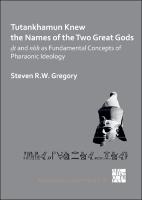Tutankhamun Knew the Names of the Two Great Gods
: Dt and nHH as Fundamental Concepts of Pharaonic Ideology
Author(s)
Gregory, Steven R.W.
Collection
Knowledge Unlatched (KU)Language
EnglishAbstract
Tutankhamun Knew the Names of the Two Great Gods offers a new interpretation of the terms Dt and nHH as fundamental concepts of Pharaonic ideology. The terms Dt and nHH have often been treated as synonyms reflecting notions related to the vastness of time. However, from the study of original source material – the texts and iconography compiled over some three millennia and authored by those who surely had complete understanding of their subject matter – it becomes clear that those modern interpretations are somewhat questionable. Clues to the connotations which may be ascribed to Dt and nHH are perhaps most clearly apparent in texts and imagery from the reign of Tutankhamun – a time of political upheaval during which it was more than usually important to express traditional mores with clarity to demonstrate a return to the well-established ideology underpinning pharaonic culture prior to the Amarna interlude. Testing those indications against the wider range of extant literary material confirms that Dt and nHH were neither synonyms, nor were they entirely temporal in nature, but rather referenced a duality of ontological conditions which together were fundamental to the fabric of pharaonic ideology. The reappraisal of this duality of conditions allows the many texts and iconographic depictions surviving from dynastic Egypt to be considered from a new perspective – one providing deeper insight into the character of pharaonic culture. Moreover, it becomes apparent that the influences of an ideology which evolved during times pre-dating the pyramid builders permeated the philosophical and theological treaties of the scholars of ancient Greece and Rome, and thence into more recent times. At least two great gods may live on.
Keywords
History; Ancient; EgyptISBN
9781789699869Publisher
Archaeopress PublishingPublisher website
https://www.archaeopress.com/Publication date and place
2022Imprint
Archaeopress Publishing LtdClassification
Ancient history


 Download
Download